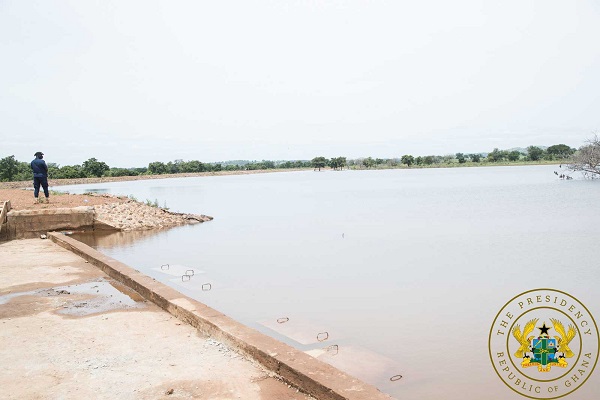
Government Has Performed Despite Economic Shocks- Dr. Tsiboe Darko
Bagbin’s Diatribe Against Akufo-Addo: A Case Of A Weak Goliath Who Can’t Stand The Might Of David
Unexplained Murders In WA
Danquah Institute committed to strengthening mental health-care delivery
DI: Gov’t has performed despite Covid shocks
To me, one of the best agriculture related policy to be rolled out by a Ghanaian government is the One Village, One Dam [1V1D] policy, and I will urge Dr Bawumia to continue with the policy and improve it when he becomes president in 2025.
Why is the 1V1D policy important for Ghana’s agriculture?
There are three main reasons why I support the 1V1D policy, as enumerated below, but I will focus on the first two.
1. To make our farming system more resilient
2. The relieve farmers of the cost burden of irrigation
3. Increase food production
Resilient farming systems
Rain fed agricultural or farming systems are normally associated with weather risk and with the increased concerns about the impact of climate change on farming, one of the means of making farming systems more resilient and also sustainable is through the provision of irrigation infrastructure. This why a policy like the 1V1D policy, rolled out by the Akufo-Addo government is relevant for a country like Ghana, where farming is largely rain fed and in northern Ghana where rainfall very erratic.
Yes, we can critique how the implementation went or how the dams [reservoirs] constructed were managed, but that does not take away the fact that it is a very good policy, and as a proponent of northern Ghana agriculture, I support it.
The most important resource or factors in farming are land/soil and water, and in terms of land and soils suitable for agriculture, the northern regions of Ghana have them, but the main factor or input limiting northern agriculture is water for irrigation due to the erratic nature of rainfall in the area.
With the small scale nature of farms in the northern regions, there is the need to get the irrigation infrastructure or water closer to the farming communities, and one of the best ways to do so is through the construction of small dams or reservoirs as the 1V1D was rolled out to do.
Relieving farmer of the cost burden
The cost of constructing such dams can be very expensive for the small scale farmers. Elsewhere, farmers have to get loans or use savings to construct such dams or reservoirs themselves but in Ghana, I support the idea of the government doing it, particularly for small scale farmers, who are not likely to afford the constructions of such dams.
There are two main types of such dams [reservoirs]: lined and unlined. The lined ones as the name suggests are lined with artificial membrane to reduce seepage, and the unlined ones, which are just lined with natural clay. In terms of cost, the lines dams are more expensive, due to the lining, however I will suggest we choose the lined type and ensure that the constructed dams are equipped with water supply or pumping system to replenish the water, either through ground or surface water abstraction. For example, in the UK, a 100,000 cubic metre capacity of lined dam [reservoir] could more than £200,000, whereas an unlined one with same capacity could cost more than £100,000, which clearly cannot be afforded by the small scale farmers in Ghana, and hence why the government of Ghana has to step in to fund the construction and the provision of ancillaries.
Source: Farm visit in UK by author in 2012
Concluding remarks
The challenges identified about the dam constructed after the policy was rolled out have been associated with the management of the dams, in terms of reducing seepage, silting and pumping stations to replenish the water. Overcoming such challenges will makes the 1V1D policy the best of providing water for farming villages or communities in five northern regions or areas of erratic rainfall.
So, I will urge Dr Bawumia and the NPP to include the 1V1D in their manifesto and improve upon it when they form the next government in 2025.
I still maintain that the 1V1D is a very good policy!
By Kwadjo Ahodo, PhD
(Agricultural Economist and a Research Fellow),
Danquah Institute
2nd Norla Street, Labone
Accra, Ghana
danquah.insti@gmail.com
+233 30 273 7479
+233 26 945 0132